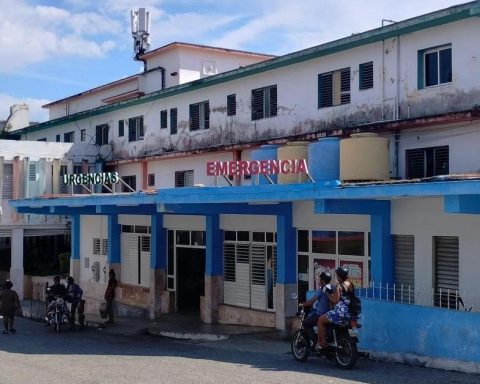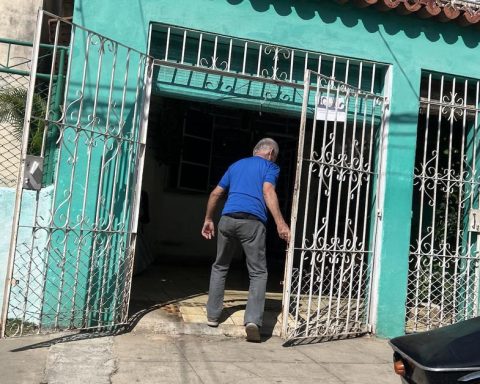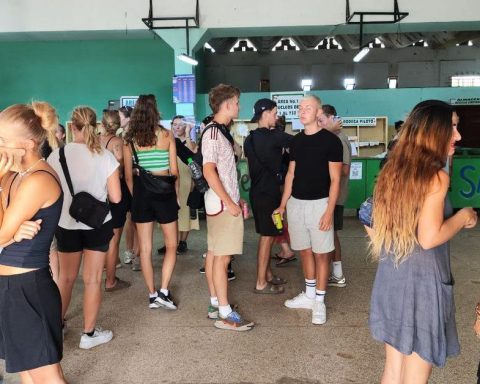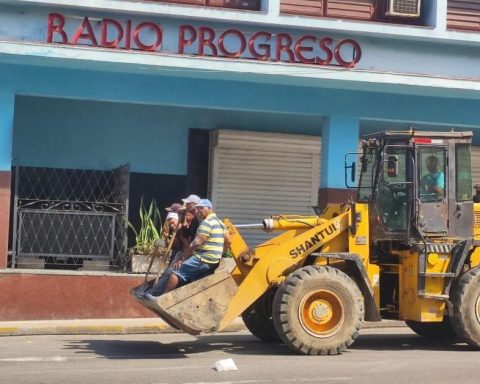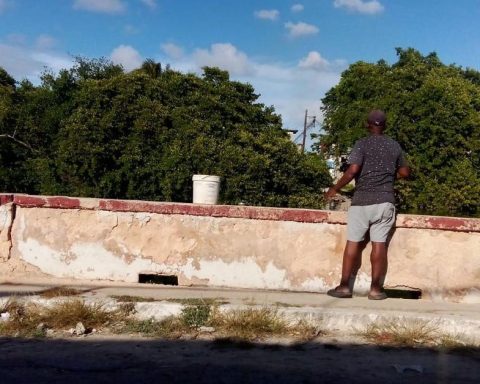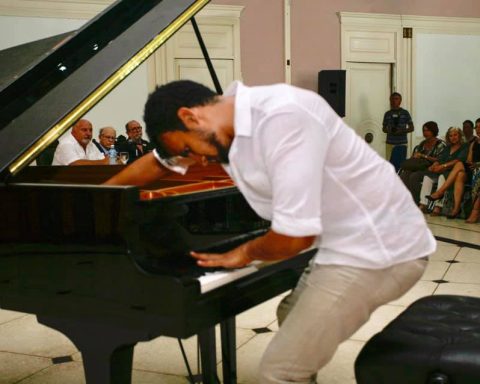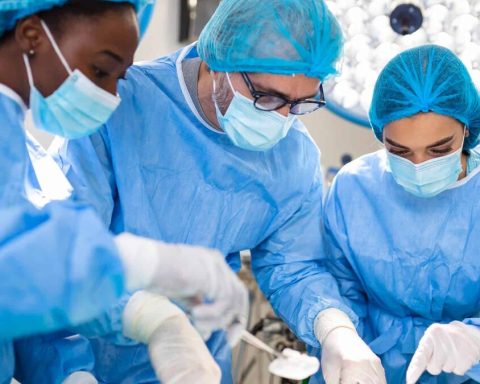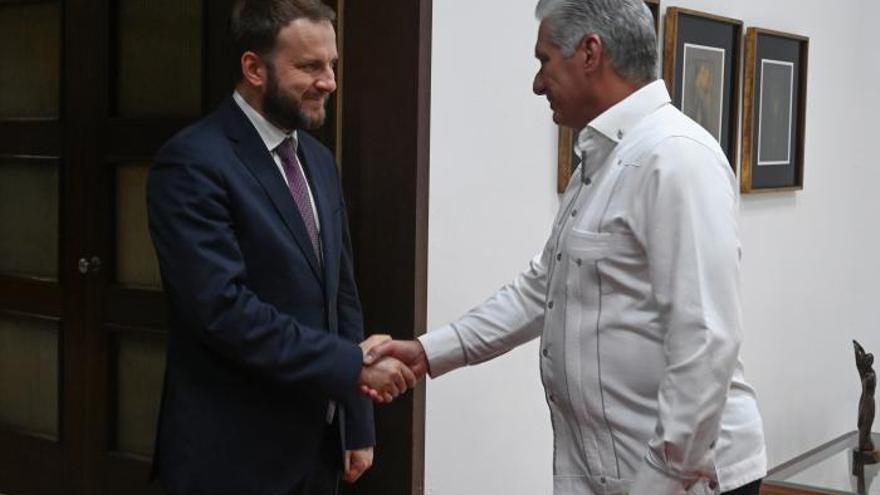
Third consecutive week of a high-level Russian visit to Cuba. Maxim Oreshkin, economic adviser to President Vladimir Putin, met on Tuesday with the highest authorities of the island, beginning with Miguel Díaz-Canel, who highlighted Moscow’s “enormous sensitivity towards Cuba’s problems.” The Cuban president recalled the Russian cooperation in August 2021, during the oxygen crisis at the worst of the pandemic, and stated: “This is a fact that we carry in our hearts, in our feelings, and that we will be grateful for all our lives.”
Oreshkin’s meetings with Ricardo Cabrisas, Deputy Prime Minister and Head of Foreign Trade and Foreign Investment, and Joaquín Alonso Vázquez, President of the Central Bank of Cuba (BCC), made it clear that, sentimentality aside, the Russian landing is on business, although nothing concrete appears on the horizon, beyond the good intentions of Moscow.
Cabrisas discussed several cooperation proposals with Putin’s man, including the possible creation of a regular Russia-Latin America or Russia-Caribbean maritime service. The recently inaugurated minister, substitute for Rodrigo Malmierca, postulated the island as the center of operations for that route, assuring that Cuba “has a maritime-port, air and road infrastructure that could allow connectivity, but that needs modernization.” With this he made it clear, without saying it, that money will have to be disbursed and where it will have to come from.
Cabrisas discussed several cooperation proposals with Putin’s man, including the possible creation of a regular Russia-Latin America or Russia-Caribbean maritime service.
Next, Cabrisas pointed out to Oreshkin other sectors where it would be possible to invest: energy, agri-food, finance and tourism, to which the Russian replied that it is necessary “to pay attention to trade to increase and diversify exports, in particular those associated with health and tourism”.
In addition, the economist spoke of exploring other ways of collaboration through foreign investment and his interest in the –sunken– sugarcane business, an industry in which the Russians have already landed through the creation of a mixed company to resurrect the central Uruguay from Jatibonico, currently undergoing renovation works.
Little has come out of Oreshkin’s meeting with the president and three vice-presidents of the BCC, except for Cabrisas’ laments about the “more than 100 banks from different regions of the world [que] operations and correspondents with the Cuban banking system were suspended as a result of being included in that unilateral list,” he said, referring to the list drawn up by Washington to sanction countries it considers to be sponsors of terrorism. That, he added, “creates delays in executing collections and payments with foreign partners”.
The restructuring of the debt with Moscow, whose extension until 2027 was negotiated by Cabrisas himself and ratified last year by Russian institutions, and the new payment system to through Mir bank cards, that since March it has been working for tourists on the Island, are some of the issues that are the responsibility of the BCC and that would justify the meeting this Tuesday, although the official press has not expressly mentioned them.
“In the end, if you scratch a little, you can see that they are the same agreements that the delegation headed by Díaz Canel had on the table during the visit to Moscow last year”
Some analysts consider that the meetings were more propaganda than concrete, for the moment, since all that has been published has been proposals, conversations and reactivation plans to finance “programs that were paralyzed at the time.”
“In the end, if you scratch a bit, you can see that they are the same agreements that the delegation headed by Díaz Canel had on the table during the visit to Moscow last year,” says economist Elías Amor in his blog. Cubaeconomywhere today analyze the meeting in a post titled Cuba and Russia: much ado about nothing. The expert recalls that for months there has been talk of plans that have not yet materialized, just as some of those projects that are now described as “paralyzed” did not before the pandemic.
Senior Russian officials already revealed in 2020 that many agreements remained a dead letter due to breaches by the Cuban side. As for the announcement of the maritime service, the most recent occurrence launched during the meeting with Oreshkin, Amor wonders why in thirty years of relationship with Russia it has not been carried out. “Cabrisas should ask himself why this service doesn’t exist and if the Russian economic leaders and the global freight forwarders really are for the job,” he warns.
In any case, Oreshkin’s visit occurs a few days after the of the Chairman of the State Duma, Vyacheslav Volodinwho was in Cuba last Saturday, April 29, and two weeks later than that of Foreign Minister Sergei Lavrov, who did the same on the 20th, with reception by Raúl Castro included.
In addition, in the previous months, the Secretary of the Security Council, Nikolai Patrushev, the executive director of the state oil giant Rosneft, Igor Sechin, and the president of the bilateral Business Council, Boris Titov, who has been advising the Cuban Government on the changes that must be made in the economy and that pass, in his opinion, through the expansion of private businesses. Cuban economists abroad consider, however, that the advice of the Russians only encourages the creation of mafia oligarchies in the style of those that have operated in that country since the fall of the USSR.
Maxim Oreshkin has become, at barely 40 years old, a key man in Putin’s war economy, according to the Bloomberg economic media.
Maxim Oreshkin has become, at barely 40 years old, a key man in Putin’s war economy, according to the Bloomberg economic media. in a profile made in August from last year. His role, according to Paris-exiled Russian economist Sergei Guriev, is “to figure out how to circumvent the sanctions and he is doing it quite successfully,” he said at the time.
Among the policies he promoted were negotiations with European Union countries that agreed to pay for Russian gas with rubles or bank plans to limit the effect of the interruption of the financial messaging service Swift.
Oreshkin, sanctioned for putting his economic policies at the service of war, is firmly against the centralized state economy. “Russia is not going to abandon the market economy, on the contrary. Now private initiative is especially encouraged. The president constantly points this out in his speeches,” he told Bloomberg.
________________________
Collaborate with our work:
The team of 14ymedio He is committed to doing serious journalism that reflects the reality of deep Cuba. Thank you for accompanying us on this long road. We invite you to continue supporting us, but this time becoming a member of our newspaper. Together we can continue transforming journalism in Cuba.
